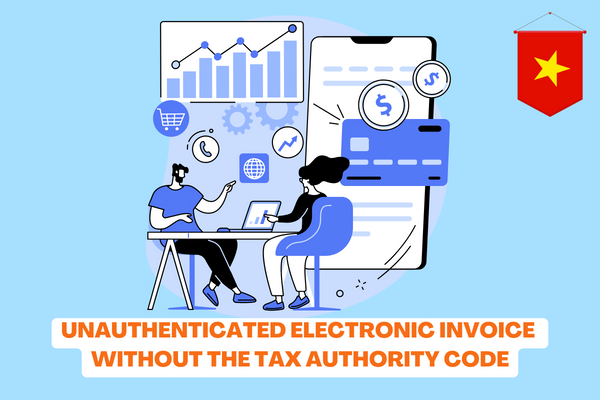Vietnam: What is an electronic invoice without a tax authority code? How many parts does the unauthenticated electronic invoice without the tax authority code include?
What is an electronic invoice without a tax authority code in Vietnam?
Pursuant to Point b, Clause 2, Article 3 of Decree 123/2020/ND-CP explaining e-invoices without codes of tax authorities as follows:
Article 3. Definitions
For the purposes of this Decree, the terms used herein shall be construed as follows:
…
2. “e-invoice” means an invoice, with or without the tax authority’s authentication code, in the form of electronic data, issued by the goods seller or service provider by using electronic instruments to record information on the sale of goods or service provision in accordance with regulations of the Law on accounting and the Law on taxation, including the invoices generated by POS cash registers that are digitally connected to tax authorities. To be specific:
a) “authenticated e-invoice” means an e-invoice that is granted an authentication code by the tax authority before it is sent to the buyer by the goods seller or service provider.
The authentication code on an e-invoice is a unique serial number generated by the tax authority’s system and a series of characters encoded by the tax authority based on the information specified by the seller on the invoice.
b) “unauthenticated e-invoice” means an e-invoice that is sent to the buyer by the goods seller or service provider without the tax authority’s authentication code.
...
Accordingly, an e-invoice without a code of a tax authority is an electronic invoice sent by an organization selling goods or providing services to a buyer without a code of a tax authority.

Vietnam: What is an electronic invoice without a tax authority code? How many parts does the unauthenticated electronic invoice without the tax authority code include?
How many parts does the electronic invoice format without the tax authority's code in Vietnam include?
Pursuant to Article 12 of Decree 123/2020/ND-CP stipulating as follows:
Article 12. E-invoice format
1. The e-invoice format is the technical standards for type of data, length of data of information fields serving transmission, storage and display of e-invoices. E-invoices shall be XML (extensible Markup Language) documents, which are meant to share electronic data between IT systems.
2. The data of an electronic invoice consists two components: information about the transaction and the digital signature. Authenticated e-invoices shall also contain the data of the tax authority’s code.
3. The General Department of Taxation shall develop and announce the format of transaction-related information, digital signatures and tools for display of e-invoices prescribed herein.
4. The following requirements must be met when sellers directly transmit data to tax authorities:
a) Connect to the General Department of Taxation via a separate channel or MPLS VPN Layer 3, including 1 main channel and 1 backup channel. Each channel has a minimum bandwidth of 5 Mbps.
b) Use an encrypted Web Service or Message Queue (MQ) for connection.
c) Use Simple Object Access Protocol (SOAP) to compile, transmit and receive data.
5. Contents of e-invoices shall be fully and accurately displayed, ensure readers can read them with electronic devices.
Accordingly, the e-invoice format without the code of the tax authority will include 03 parts as follows:
- Components containing e-invoice business data
- Components containing digital signature data
In which case is to use an e-invoice with the code of the tax authority but not to pay in Vietnam?
Pursuant to Article 14 of Decree 123/2020/ND-CP stipulating as follows:
Article 14. Provision of e-invoice services
1. The following entities are not required to pay service charges for a period of 12 months from the date of commencement of the use of authenticated e-invoices:
a) Small- and medium-sized enterprises, cooperatives, household and individual businesses that operate in disadvantaged areas or extremely disadvantaged areas. Disadvantaged areas or extremely disadvantaged areas are defined in the List of areas eligible for investment incentives enclosed with the Government’s Decree No. 118/2015/ND-CP dated November 12, 2015 and its amending or superseding documents (if any).
b) Other small- and medium-sized enterprises which are defined according to the requests of the provincial People’s Committees submitted to the Ministry of Finance, except enterprises operating in economic zones, industrial parks or hi-tech zones.
The General Department of Taxation shall directly provide or entrust e-invoice service providers to provide free of charge authenticated e-invoices for the abovementioned entities.
2. When using authenticated e-invoices or unauthenticated e-invoices provided by e-invoice service providers, enterprises, business entities, household and individual businesses other than those specified in Clause 1 of this Article shall pay service charges under terms and provisions of the signed contracts.
According to the above provisions, the following businesses and organizations will be able to use e-invoices with the code of the tax authority but do not have to pay:
- Small- and medium-sized enterprises, cooperatives, household and individual businesses that operate in disadvantaged areas or extremely disadvantaged areas. Disadvantaged areas or extremely disadvantaged areas are defined in the List of areas eligible for investment incentives enclosed with the Government’s Decree No. 118/2015/ND-CP dated November 12, 2015 and its amending or superseding documents (if any).
- Other small- and medium-sized enterprises which are defined according to the requests of the provincial People’s Committees submitted to the Ministry of Finance, except enterprises operating in economic zones, industrial parks or hi-tech zones.
Note: The General Department of Taxation shall directly provide or entrust e-invoice service providers to provide free of charge authenticated e-invoices for the abovementioned entities.
LawNet
